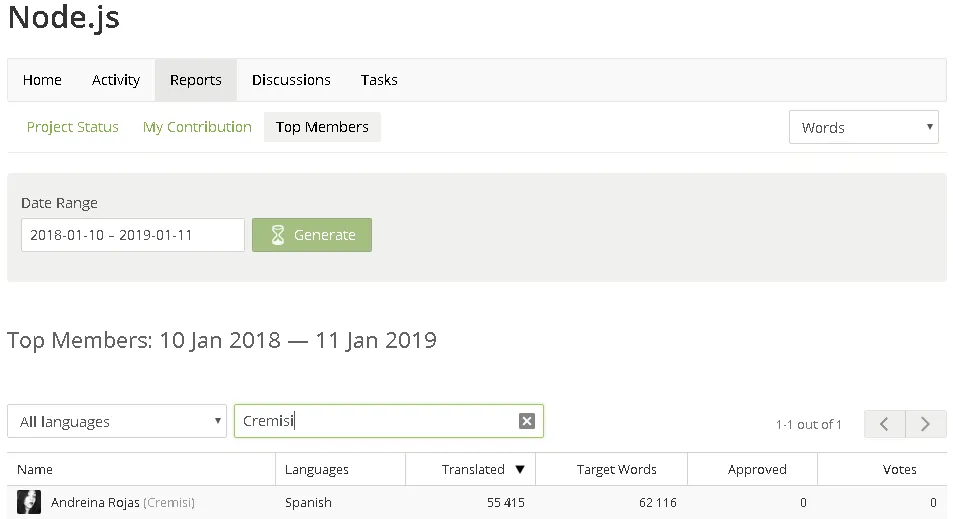
Repository
https://github.com/nodejs/i18n
Project Details
Node.js is an open-source, cross-platform JavaScript run-time environment that executes JavaScript code outside of a browser.
Node.js came into existence when the original developers of JavaScript extended it from something you could only run in the browser to something you could run on your machine as a standalone application.
In simple words, it's an open source execution environment for developing web applications, which is event-based, it uses the V8 engine to provide an execution environment that compiles and executes JavaScript at a higher speed. It is possible to run Node.js without any restriction on Windows, Linux and Mac OS X.
It should be noted that it is NOT a server language, this means that it executes code, so it could be understood as an interpreter.
Contribution Specifications
Node.js is currently being translated into 33 languages. I´m contributing to translate it into the Spanish language. So far, we have managed to translate 45% of the project.
Translation Overview
I continue with the ChangeLog_V7.md folder
In my previous contributions, I explained what a change log is about. A Changelog is a record of all the notable changes made to a project, it usually includes change records such as new features or bug fixes. It includes all the changes historically, although it is intended that a Changelog does not include all the changes, but rather it contains a list of notable changes ordered chronologically for each version of a project.

During this contribution, I finished translating the commits belonging to the version 7.7.0 and I started with the version 7.6.0
Examples:
Version 7.7.0
English:
fe2df3b842 - (SEMVER-MINOR) async_wrap,src: add GetAsyncId() method (Trevor Norris) #12892
Spanish:
fe2df3b842 - (SEMVER-MINOR) async_wrap,src: añadir método de GetAsyncId() (Trevor Norris) #12892
In this commit, it is urged to allow the handles to retrieve their own uid's by adding a new method on the functiontemplates. Implementation of these into all other classes will come in a future commit. It's preferable that there be checks in there for these things, but a way of placing them hasn't been found that wouldn't be just as unreliable.
Version 7.6.0:
English:
0432c6e91e - (SEMVER-MINOR) async_wrap: use double, not int64_t, for async id (Trevor Norris) #12892
Spanish:
0432c6e91e - (SEMVER-MINOR) async_wrap: usar double, no int64_t, para la id asíncrona (Trevor Norris) #12892
The number of ids is limited to 2^53-1 regardless of whether an int64_t is used or not because JS is limited to a double. So to make conversion simpler, track ids internally as a double. This will also make life simpler when this is eventually exposed to JS via a Float64Array.
Languages
This contribution was translated from English to Spanish.
Word Count
- In this contribution, I've translated 1212 words
- I've translated a total of 55215 words so far.
Previous translations on this project
Part 13
Proof of Authorship

You can check My Crowdin Profile for verify my contribution in this project.